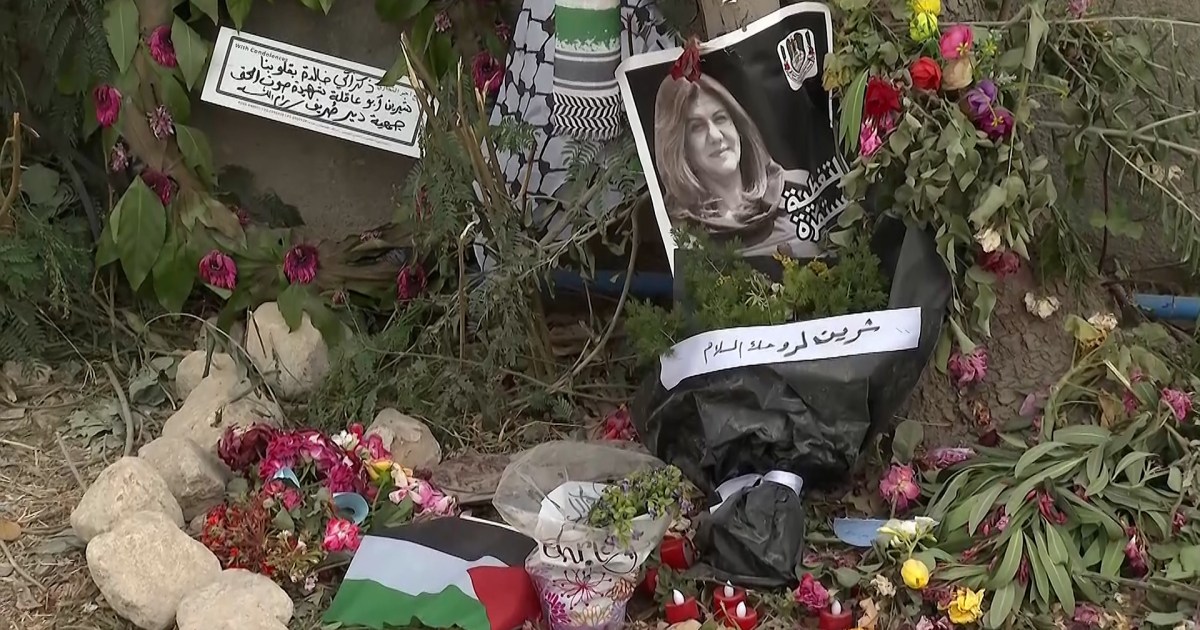An Israeli official revealed that one of the occupation soldiers, who was carrying a rifle equipped with a telescopic lens, shot colleague Shireen Abu Aqleh, while US Secretary of State Anthony Blinken confirmed that Washington supports the investigation into the killing of Shireen.
Haaretz newspaper quoted the Israeli official as saying that an Israeli soldier, who was sitting in a jeep, fired about 190 meters from the whereabouts of the martyr Shirin Abu Aqila in Jenin, and he may have hit her.
She added that the soldier accused of assassinating Shirin said during his interrogation that he had not seen her and did not know that he had shot her, noting that the soldier was sitting in a jeep, armed with a rifle equipped with a telescopic lens.
For its part, the Israeli Channel 12 said that Washington asked Israel for clarifications regarding the investigation into the assassination of Shireen Abu Akleh.
In turn, US Secretary of State Anthony Blinken renewed his condolences for the loss of Shireen Abu Akleh, and said he appreciates the journalistic work she did in her life.
He also confirmed support for the investigation into her murder, and announced that he had spoken directly with her brother.
A senior US official told Al Jazeera that Blinken offered continuous support from the State Department team in Jerusalem to the Shirin family, and praised Abu Aqila's journalistic work and the importance of a free and independent press.
Funeral assault
The Israel Broadcasting Corporation also reported that the police commissioner had ordered an investigation into the behavior of the security units during the funeral of the late Shirin.
The European mission in Palestine also rejected the Israeli police's account of the attack on the funeral of Shireen Abu Aqleh.
The representative of the European Union in Palestine, Sven Kuhn von Bergsdorff, described the Israeli narrative as inaccurate and misleading.
He urged it not to involve European Union officials in the context of its attempt to justify its actions in the occupied territories.
He explained that a third party other than the police and Shirin's family had requested European participation in de-escalating the escalating tension between the police and mourners.
He reiterated the description of Israeli behavior during the funeral as inappropriate and disrespectful.
In an interview with Al Jazeera, von Bergsdorff had expressed his shock at the unnecessary level of violence shown by the Israeli police during the funeral of the martyr Shirin.
The European official said that he had hoped that the funeral of the icon of the Palestinian press would take place in a way that respects her memory.
On Friday, thousands of Palestinians participated in the funeral of Shireen Abu Aqleh, who was shot dead by the occupation while she was preparing to cover the storming of the Jenin refugee camp last Wednesday, even though she was wearing a bullet-proof vest with the "press" logo and a protective helmet.
When the coffin was taken out of the French Hospital in East Jerusalem, the occupation police stormed the hospital yard and tried to disperse a crowd whose participants were chanting and waving Palestinian flags.
The coffin nearly fell to the ground when the police beat its bearers with batons, before it was straightened and raised at the last moment.
blurring the facts
With Israel's promises to investigate the behavior of its police during Shirin's funeral, B'Tselem reported that the Israeli military investigation apparatus is merely a system to conceal facts, as the investigation process is unbearably slow.
The Israeli Center gives an example of this by submitting since 2000 to the Military Prosecution Office with requests to investigate 739 incidents of killing and assaulting Palestinians whose credibility was confirmed by B'Tselem, and that a quarter of these cases were never investigated until mid-2016.
The center explained that about half of the cases in which an investigation file was opened and closed without any result.
It was also found to him that the chances of a complaint ending with an indictment are only 3%.
B'Tselem concludes that accordingly, it has decided since 2015 to stop filing complaints with the Israeli military law enforcement apparatus, because the Military Public Prosecution Office - in its opinion - is nothing but a tool to camouflage the crimes committed by the Israeli forces, and to protect the army from accountability.

